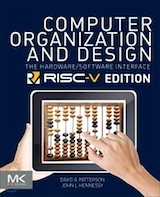
|
FreeComputerBooks.com
Links to Free Computer, Mathematics, Technical Books all over the World
|
|
- Title: Computer Organization and Design RISC-V Edition: The Hardware Software Interface
- Author(s) David A. Patterson, John L. Hennessy
- Publisher: Morgan Kaufmann; 1st edition; eBook (Free Online Edition)
- Hardcover/Paperback: 695
- eBook: PDF
- Language: English
- ISBN-10/ASIN: 0128122757
- ISBN-13: 978-0128122754
- Share This:

|
This book features the RISC-V open source instruction set architecture, the first open source architecture designed to be used in modern computing environments such as cloud computing, mobile devices, and other embedded systems.
About the Authors- David Patterson is the Pardee Professor of Computer Science, Emeritus at the University of California at Berkeley.
- Computer System, Organization, and Architecture
- Embedded Systems
- Computer Operating Systems
- Assembly and Machine Languages
- Electronics and Chips Design/Programming

- Computer Organization and Design RISC-V Edition: The Hardware Software Interface
- The Mirror Site (1) - PDF
-
 Getting Started with RISC-V (Niklas Källman)
Getting Started with RISC-V (Niklas Källman)
This book is intended for developers and professionals developing embedded software using RISC-V. It explains how to get started with developing for the free and open RISC-V, both in simulation and on physical implementations.
-
 MMIXware - A RISC Computer for the Third Millennium (D. Knuth)
MMIXware - A RISC Computer for the Third Millennium (D. Knuth)
The book provides a complete documentation of the MMIX computer and its assembly language. It also presents mini-indexes, which make the programs much easier to understand.
-
 Basic Computer Architecture (Smruti R. Sarangi)
Basic Computer Architecture (Smruti R. Sarangi)
This book is a comprehensive text on basic, undergraduate-level computer architecture. It includes the combinational units, ALUs, processor, basic 5-stage pipeline, and a microcode-based design.
-
 Computer Organization and Design Fundamentals
Computer Organization and Design Fundamentals
This book takes the reader from the basic design principles of the modern digital computer to a top-level examination of its architecture. The material is presented using practical terms and examples for a better computer systems design.
-
 Principles of Computer System Design: An Introduction (J. Saltzer)
Principles of Computer System Design: An Introduction (J. Saltzer)
This book takes a principles-based approach to the computer system design. Through carefully analyzed case studies from each of these disciplines, it demonstrates how to apply these concepts to tackle practical system design problems.
-
 Computer Systems: A Programmer's Perspective, 2nd Edition
Computer Systems: A Programmer's Perspective, 2nd Edition
This book introduces the important and enduring concepts that underlie computer systems by showing how these ideas affect the correctness, performance, and utility of application programs.
-
 The Elements of Computing Systems: Building a Modern Computer
The Elements of Computing Systems: Building a Modern Computer
This book gives a refreshingly new way of looking at computer systems as a whole by considering all aspects of a complete system in an integrated manner, as its comes to play in the construction of a simple yet powerful computer system.
-
 Scientific Programming and Computer Architecture
Scientific Programming and Computer Architecture
The book digs into linkers, compilers, operating systems, and computer architecture to understand how the different parts of the computer interact with programs. It begins with a review of C/C++ and explanations of how libraries, linkers, and Makefiles work.
-
 How Computers Work: Processor and Main Memory, 2nd Edition
How Computers Work: Processor and Main Memory, 2nd Edition
This book starts out very simple and gets more complex as it goes along, but everything is explained. The processor and memory are mainly covered. It explains in great detail the operation of a simple but functional computer.
-
 The Secret Guide to Computers (Russ Walter)
The Secret Guide to Computers (Russ Walter)
It's the one book that covers everything today's beginners and near-beginners need to know: not just about Windows, but also about software, hardware, and the Internet. It explains complicated concepts simply and clearly, and empowering beginners.





